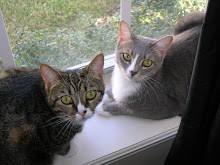 This morning I was reminded of one of these symptoms when I made an appointment to see my otolaryngologist - fancy word for ear, nose, throat doc - for an ear issue (I've had them since childhood; they aren't liver related). I remember that I last saw him 2 1/2 years ago because of nose bleeds. Yep, nose bleeds - just another one of the pesky little symptoms that may or may not plague other people awaiting liver transplants.
This morning I was reminded of one of these symptoms when I made an appointment to see my otolaryngologist - fancy word for ear, nose, throat doc - for an ear issue (I've had them since childhood; they aren't liver related). I remember that I last saw him 2 1/2 years ago because of nose bleeds. Yep, nose bleeds - just another one of the pesky little symptoms that may or may not plague other people awaiting liver transplants.
Here's what The Hepatitis Trust says about the condition:
Abnormal Blood Clotting (Coagulopathy)
The liver makes a number of coagulation (clotting) factors including prothrombin and fibrinogen. Most of these require the presence of vitamin K to function normally. Vitamin K, which is a fat soluble vitamin, in turn requires bile salts to be absorbed properly by the body. If the liver does not produce enough bile this will have a knock on effect on the capacity to clot blood. This can lead to so called thin blood and increases the risk of bleeding. Warning signs of mild coagulopathy problems include frequent nose bleeds, prolonged bleeding of the gums, and bruising easily. You should see a doctor immediately if any of these warning signs are present.Before my transplant I didn't experience varices - bleeding in the esophagus that is extremely serious because it's unpredictable and can be fatal - yet I sometimes wondered if it were possible to bleed to death through my nose. My nose bleeds occurred randomly, without warning, and sometimes would not stop for extended periods (15 to 30 minutes, which seemed like a lifetime when I was in business meetings).
So, I saw Dr. M and learned that the procedure to address the bleeds required cauterizing some of the blood vessels running to my nose. As I frowned at that prospect, he went on to say that any relief would be temporary and the only real way to "fix" the problem was by having a liver transplant. Sure to his word, I haven't had a single nose bleed since my transplant (though, in retrospect, the cauterization procedure would surely have been easier than a transplant; at least I didn't have to do both!).
As awkward and challenging as they were, the nose bleeds didn't hurt. At most, my nasal passages felt raw at times and I used a nasal moisture product to ease the discomfort. On a "This Sucks" scale of 1 to 10, with 10 being the suckiest, I give nosebleeds a 3 to 4 (mostly because of the mess and how much they alarmed other people). I had other symptoms of end-stage liver disease that were FAR worse - and I'll tell you about them another time.




No comments:
Post a Comment